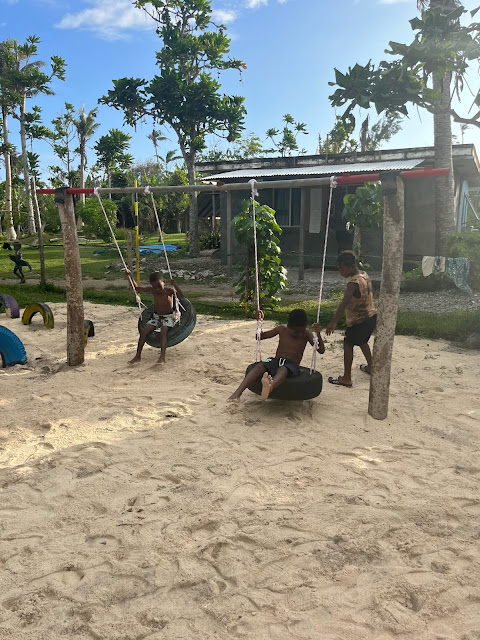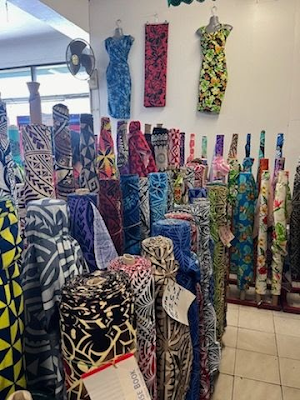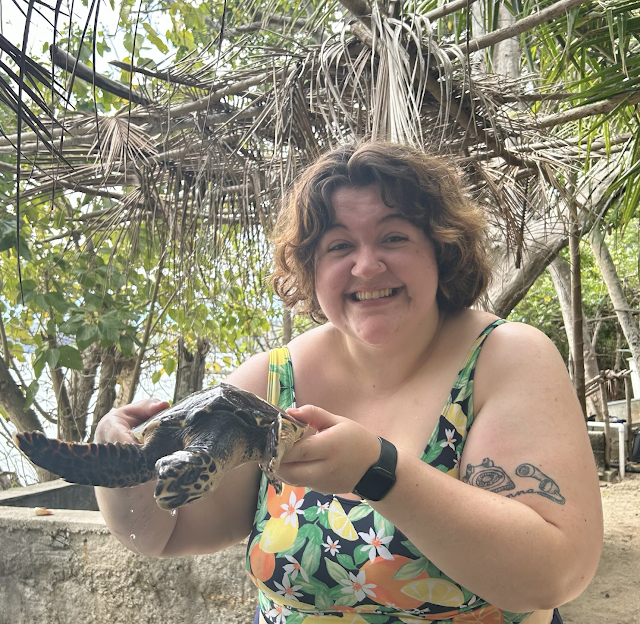Vanuatu Department of Corrections
Trying to describe what it is like waking up in Vanuatu is like trying to describe a dream because you are truly waking up in paradise. Our villa sits on a beautiful beach looking out at the South Pacific Ocean providing the ultimate view of picturesque clear blue waters, white sand, and tropical landscape. Each morning I wake up and enjoy a cup of coffee or orange juice on our deck only steps from the beach. As I journal, I hear the birds chirping, the wind whispering through the trees, accompanied by the waves crashing along the shore orchestrating the perfect symphony.

With such beauty in every morning, it is hard to imagine that Vanuatu offers anything less than the perfect paradise I have grown accustomed to, but darkness is always lurking beyond the brightness. In the shadows beyond the tourism, beautiful beaches, and smiling faces, there is a lot of violence and crime. The legal system in Vanuatu integrates both English common law and indigenous customary law. Rather recently, in 2006, Vanuatu introduced “Dipatmen Blong Koreksenol Sevis” which provides correctional services to the country. Typically, all services are shut down during the holidays, but because of Professor Buske’s local connections, we were lucky enough to tour the correctional facilities today.
The most incredible part of studying abroad in Vanuatu is the opportunity to learn in everything you do. We typically begin every day that we spend away from the villa with a 20-minute or so bus ride into downtown. During the journey, we have had the opportunity to meet so many different NiVans (locals) and even just local patrons who are riding the same bus – and by bus I really mean van. As we were leaving, the 3-year daughter of George, the villa groundskeeper, was clinging to someone and terribly upset and crying. We learned that the man was her “Small Father” (or as we would say stateside, her uncle) and he was leaving. It is the little moments like this that open the authenticity of this experience. We learned that he is only on the island three months out of the year as he goes to Australia for the Odyssey Program (9 months out of the year he is over there picking fruit and such). This is just a small example of the culture we have merged into in just a simple daily thing we do.
As we rode the bus into town to visit the Medium Security Centre, which also includes their high-security unit, someone made a joke about the eeriness of asking the bus to drop us off at prison, but I imagine it may be a more common request than we think.
 |
|
The facility was surrounded by barbed wire and there was a guard at the gate. Once we were finally allowed to enter, we were taken to a small shed-like building with open windows where we met Principal (warden) Timothy, a new friend I think we are all grateful for. Here in Vanuatu, there are village chiefs and there are also courts. These two legal systems can work together. Timothy, the bloodline of a chief, is a very educated man. He went to school to be an accountant and while he worked at his office on the hill, he watched the cruise ships entering the port. He decided he wanted more and became a chef, allowing him to travel the world working on cruise ships. Eventually, he returned to Port Vila, Vanuatu, and joined the Corrections Department and worked his way from Officer to Principal. Timothy is close to retirement; he is currently 43 and will retire at 45. You could see his excitement about retiring, but also the pain of leaving behind his job. Timothy was very generous with his time - he answered all our quesitons in great detail. One very noteworthy thing to mention about Timothy is the eye contact he made with every single person in our group. Often, we have noticed men here will not make eye contact when speaking to the women of the group, but Timothy held eye contact allowing us to see the depths of kindness behind his eyes.



The Vanuatu Criminal Justice System mirrors many components of the American Criminal Justice System, likely because they are both based on English Common Law. In Vanuatu, when an offense occurs, the court must issue a warrant for a perpetrator to be taken to the prison, where they remain until the investigation is complete. Once the investigation is complete, a person may get bond until their sentencing occurs. The courts use a database similar to the ones we have in the states that help calculate a sentence. Once the individual is sentenced, oversight and control of the perpetrator shifts from the court system to corrections. It is up to the Principal to decide when a person can move from medium security to lower security.


Prisoners can apply for parole through the parliament parole (courts) or the presidential parole. Both routes require the recommendation of the Principle. In preparation for a parole hearing, correction officers closely watch inmates to determine whether they have truly changed their ways. The parole and process for moving to lower security seems very similar. The Principal will talk to the members of the community including their pastor and chief to get a better idea of who the person was before they arrived at the facility. They will see if the offender takes responsibility for his offences and will usually consider the victim’s input. The Principal then decides whether they have really learned from what they did. That seems to be the theme and purpose of corrections in Vanuatu – giving them time to learn from what they did and truly change. While some people still believe that prisoner's can't truly change, one big difference from the American system is that there is no shaming here and they give offenders a chance in society again. For example, there is no sex offender registry for communities to see.


There is recent legislation requiring juvenile offenders to be held separatly from offenders, but there's been no real progress in actually building a facility due to lack of funding. The new legislation requres that anyone under 18 must be separated from adult -- even if they are only 2 months from turning 18. This is because it is really dangerous for juveniles to be mixed in with adults -- the majority of whom are sex offenders. For juveniles, jail is the last option. The Court and villages will work together to try and teach the juveniles and whether they learn or reoffend determines whether they are on the prison pathway. Most juvenile offenders are those who do not live with their parents and often live with their grandparents. Most of the crimes that juveniles commit are theft crimes. There are more Gangs forming and graffiti has recently begun popping up.
There are currently 13 offenders in the high-security unit and about 57 in the medium-security unit. Principle Timothy explained that 85-90% of the prison population has committed some type of sex offense, and about 50% of the time the victim was a family member. About 2% of the population is there for theft. The high-security unit no longer has toilets because inmates damaged them. The cells are metal shipping containers with latches on the outside to keep the inmates in. Our visit occurred during lunchtime and we were able to observe that process. For me, as an abolitionist to begin with, I felt uncomfortable watching the inmates during lunchtime. I watched as the guard unlatched one of the containers allowing one inmate at a time to run into the courtyard, grab their plate and run back to the cell. It reminded me of watching animals in a corral being released one by one for their grazing time – but unlike those animals who had the freedom to roam fields as they ate, the inmate had seconds to grab their plate and return to their airless metal box. For me, this felt like observing animals in a cage and was such a sobering experience. In the States, I talk to clients in jail weekly who complain about the most trivial things – if they only knew what their life could be like during incarceration here.
Many of the inmates look to Principle Timothy like a father; in fact, that is what they call him. The “Timothy Way” of corrections consists of the idea that an inmate's time in his unit is to be isolated from the community to think about the wrongful acts committed and how to become a better person for their community. As Timothy talked with us you could see the compassion behind his telling eyes. Timothy implemented something his professor in school said “This is my kingdom; do not do what I do, but do what I say” a phrase that made him want to quit school. His father told him to learn what the lesson behind that phrase was and now it is something he uses himself. He believes rules are rules and gave an example that phone use occurs Monday and Friday and letting inmates use phones any other day teaches them nothing. Instead, he encourages the inmates to prepare themselves for when they can use the phone. It seems like Timothy does everything intentionally and believes in all of his decisions teaching a lesson thus, making him like a father. His philosophy is the time an inmate is sentenced is their time to truly change. Not all officers follow the “Timothy Way” as some believe the old fallacy “once a criminal always a criminal.” There are recidivism problems in Vanuatu which Timothy contributes to once they leave the facility they change and go back to the person they were before. Vanuatu does have a parole system which is often times heavily dependent on the chiefs and ministers of the villages.
One big difference between Vanuatu prisons and American prisons is the ability to “check out”. The lower security facility is sometimes referred to as the "library" becuase, if you have the money, you are allowed toleave the facility to attend school – there was one inmate that got his master's because he was there for so long – or you can go home for a funeral. You must be able to pay your own way and pay for an officer to escort you.
After Timothy showed us around, we were able to talk with George, the Senior Corrections Officer. George explained more about the inner workings of the facility. In his office, we were able to see the groupings of people in the medium security portion of the facility which currently has a population of 57 inmates, including one juvenile. George explained that they try to group people in cells according to share a language and will be able to understand each other. Oftentimes, because they may have brothers and uncles and people from the same villages, they will try to house them together in one cell. There is currently one ex-pat who resides at the facility in isolation because his culture is very different than all the other inmates. George told us the inmates typically eat a lot of chicken and rice or fish and rice.


George talked to us more about why the phone usage is only two days per week. He explained that inmates can purchase cell phones with their own money, but that the are not allowed to keep them in their cells -- instead, the facility keeps them an inmates are only given access to them twice a week. Inmates used to be able to use their phones anytime they wanted, but because so many people were using their phones to plan escapes and talk to inmates in other facilities, phone access was reduced to only two days per week. When an inmate escapes, the corrections officers have to stop what they are doing to find them. Now, when the inmate enters the facility, they get intake information so they know who they are and where they come from. Now, when an inmate escapes, the officers talk to their chief and pastor before involving police, which usually works and the inmate is found in a few hours. Sometimes, the police do have to become involved. George explain that, in the past, officers often "tortured" escapees when they were captured. However, now there is training in place to prevent that dynamic.
Timothy was kind enough to escort us to the lower-level security center which was very different. We were able to meet the lower-level acting principal, Leslie. Leslie allowed us to tour the facility, which is currently home to 69 men. There was a bakery building where the inmates make fresh bread every day for their breakfast and a kitchen building that also has kitchen storage.
The inmates were not confined to cells and instead are kept in an open setting with a courtyard in the middle and their cells which were open surrounding the courtyard. We were able to walk into the courtyard and shake hands with some inmates who we assumed were chiefs. One key difference I noticed is that many individuals were talking on their cell phones at this facility. The facilities try to give the inmates life skills and at the lower level facility they do woodworking and the inmates can make beautiful items. We saw a cabinet that one inmate made and will sell for money.

Next to the lower level center is the women’s center, which we did not visit but Timothy shared information about the operations. Currently, there are 5 women at the center; Timothy did not share their exact charges but said that women are often incarceraated for embezzlement, theft, abortion, and prostitution. Sometimes fathers will have to bring babies twice a day to the center to allow the mothers to breastfeed.
After concluding the facility visits we were able to go off on our own and explore Vanuatu. I chose to explore downtown with my own ex-local tour guide, Professor Buske. We were able to check out many of the local shops and stopped into one of my favorite things I’ve encountered in Vanuatu, Jill’s café! Jill is an ex-pat who owns a popular cafe here which hosts a mini book shopm of used/dontaed books. People can purchase books from the a bookshelf based on the honor system and the proceeds go towards helping a non-profit veterinarian.

Following a quick tropical monsoon after a lovely day of exploring we all reconvened for “family dinner” over some delicious lentil soup. Every day at dinner we go around the table and everyone shares the high point of our day (mine was Jill’s books for dogs) and decompress all the things we learned. One nice thing about the villa (at least for me) are the random dogs that also enjoy the property. One dog typically joins us for family dinner, we named her Nala.
This island has its beauty and the darkness that follows. Despite the copious amounts of daily violence against women and children, most locals smile and wave as we pass them on the roads. I’m not sure how such beauty and violence cohabitate creating an island of true genuine smiles and laughter, but that is the magic behind the islands of Vanuatu.




























































